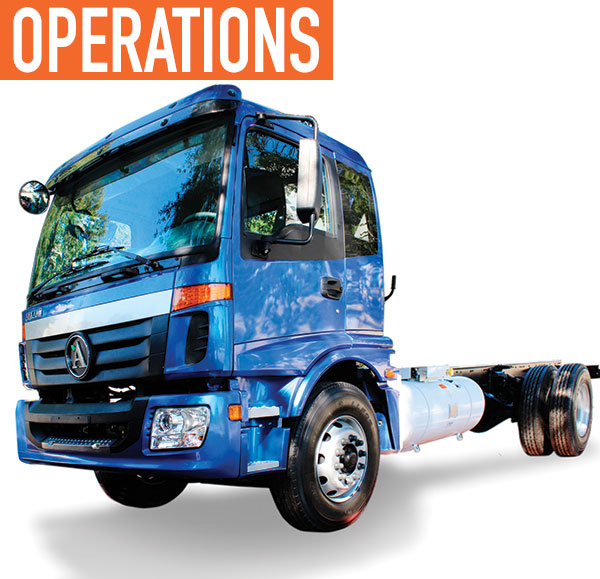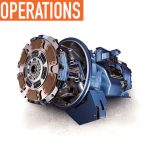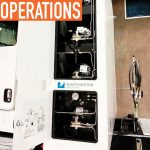Alkane Truck Company has chosen Propane autogas (LPG) to fuel its first Class 7 cab-over 26,000 and 33,000 GVW truck. Production begins first quarter 2016 with the purchase price comparable to an equivalent diesel truck.
The Alkane Class 7 cab-over truck comes equipped with a Power Solutions International (PSI) 8.8-liter big block engine with a durability-tested Bi-Phase Technologies Liquid Propane Autogas or Compressed Natural Gas fuel system and is complemented by the Allison 2500 series heavy-duty automatic transmission with torque that is comparable to diesel. Currently, it is the only cab-over truck in these weight classes running on LPG available in the US market. Due to less carbon build-up and friction, natural gas powered engines generally surpass the lifecycle of their gasoline and diesel counterparts, in some cases exceeding 1,000,000 miles of service.
AN AFFORDABLE SOLUTION
Propane autogas technology for on-road use for fleets is proven and available now. As the number one alternative fuel in the world, propane autogas powers more than 17 million vehicles around the globe. The US, however, currently has less than two percent of the world’s propane autogas vehicles, but US autogas usage is on the rise. And … it is an American-produced fuel. The US has the world’s largest supply of natural gas from which propane is produced.
The price comparison between propane autogas and diesel is motivating many fleet operators to consider the move to propane autogas. The current fleet volume discounted price of an equivalent gallon of liquid propane is $1.15 compared to $2.49 or more for diesel fuel. The fuel cost savings and maintenance savings (as a result of no carbon deposits) are significant to any fleet’s bottom line.
A LASTING ALTERNATIVE
When it comes to availability, there are more than 2,500 propane autogas fueling stations across America—and that number is growing. The propane distribution system is also well developed in the US, with more than 70,000 miles of pipeline. Additionally, according to ICF International, the transport system is sufficient to support significant growth in the US autogas industry and propane supply can keep up with demand. This supply and demand analysis shows that propane autogas is not just a short-term solution for fleets.
One benefit of implementing propane autogas as your fuel of choice is the free home-base propane autogas fueling station installation offered by several national propane marketers. The propane supplier will up-charge the fleet 15-20 cents per gallon to recoup their investment and earn a profit. The fleet operator would be responsible for installing the skid or pad upon which the equipment stands, as well as the electric component. The fleet operator would then commit to buying propane specifically from the supplier for an agreed upon period.
SIGNIFICANT ADVANTAGES
Below are some specific advantages for considering propane autogas for your fleet:
- Propane is a non-toxic, clean-burning fuel that can be used to safely power today’s technically advanced, spark-ignited engines. With propane, there is no spillage loss during refueling.
- Propane tanks, fuel lines, and carburetion components meet or exceed strict specifications. Built-in safety devices automatically shut off the flow of fuel in case of an accident.
- Propane autogas tanks are 20 times more puncture resistant than gasoline tanks and can withstand four times the pressure when compared to conventional gasoline vehicle tanks.
- Propane autogas tanks are tested to four times their standard operating pressure.
- Municipal and state tax incentives and rebates are available for propane-powered vehicles.
- Autogas vehicle tanks are constructed from carbon steel under code developed by the American Society of Mechanical Engineers.
- Propane autogas ignites at 920 to 1,020 degrees Fahrenheit, compared to 495 to 535 degrees for gasoline, meaning there is a decreased possibility that autogas will accidentally ignite.
- Propane autogas only burns at a small fuel-to-air ratio and it dissipates quickly into the open atmosphere, making ignition less likely.
- Propane autogas is nontoxic, nonpoisonous, and insoluble in water, unlike gasoline, diesel, methanol, and ethanol.
After weighing the facts, the choice should be easy.![]()
ABOUT THE AUTHOR:
Stephen M. Rayborn is a graduate of the University of North Carolina and is the VP of global sales for Alkane Truck Company. He and CEO Bob Smith have been working on bringing this project to the US market for the past 4 years.
_______________________________________________________________________
MODERN WORKTRUCK SOLUTIONS: JANUARY 2016 ISSUE
Did you enjoy this article?
Subscribe to the FREE Digital Edition of Modern WorkTruck Solutions magazine.
![]()




